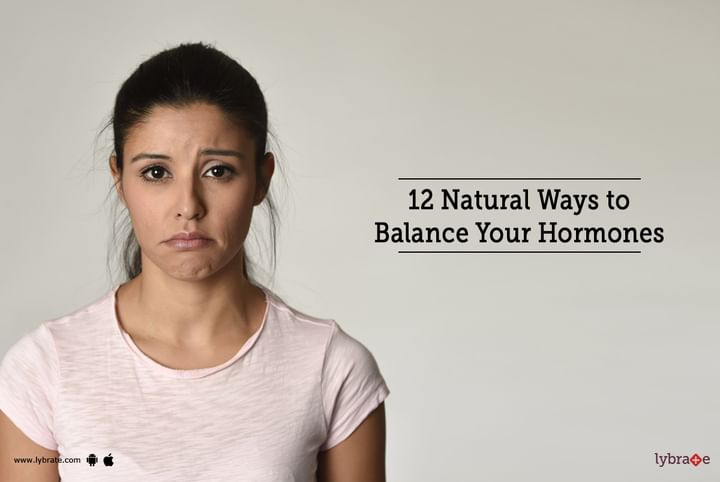Get the App
For Doctors
Login/Sign-up
Last Updated: Mar 14, 2023
BookMark
Report
12 Natural Ways to Balance Your Hormones
Dr. Janani ManoharanGynaecologist • 17 Years Exp.MBBS, MD - Obstetrics & Gynaecology, MRCOG, F.MAS, D.MAS, FICRS
What is Hormonal imbalance?
An imbalance of hormones can occur when there is either an excess or a deficiency of a particular hormone in the bloodstream. This can be caused by a variety of factors, such as certain medical conditions, lifestyle choices (diet, exercise, and stress levels), medications, and genetics.
Types of hormonal imbalance:
- Oestrogen Dominance: When there is an imbalance between the hormones oestrogen and progesterone, with oestrogen being the dominant hormone, this condition can occur. This can cause symptoms such as mood swings, weight gain, bloating, irregular periods, fatigue and breast tenderness.
- Thyroid Imbalance: This condition manifests itself when the thyroid gland produces an abnormally high or low amount of the hormone thyroxine, which plays a role in regulating metabolism as well as other bodily functions.Symptoms can include fatigue, weight gain/loss, anxiety and depression.
- Adrenal Imbalance: This occurs when the adrenal glands produce too much or too little of the hormones cortisol and adrenaline. Symptoms can include insomnia, low libido, fatigue and depression.
- Testosterone Deficiency: This condition arises when a person has a testosterone level that is lower than what is considered normal. It can result in symptoms such as low sex drive, erectile dysfunction, and decreased muscle mass in the affected individual.
- Prolactin Imbalance: This occurs when there is an increase in the hormone prolactin which stimulates milk production in women who are breastfeeding but can also lead to infertility in both men and women if left untreated. Symptoms can include irregular menstrual cycles, galactorrhea (milk production) and infertility in men or women.
What are the signs and symptoms of Hormonal imbalance?
- Changes in menstrual cycle: Hormonal imbalances can cause irregularities in the menstrual cycle, such as infrequent or absent periods, heavy bleeding, and prolonged periods.
- Infertility: Hormonal imbalances can affect fertility by interfering with ovulation and making it difficult to conceive.
- Weight changes: Changes in appetite and metabolism can be triggered by fluctuating hormone levels, which can result in either a sudden gain or loss of weight.
- Sleep disturbances: Hormones play an important role in regulating sleep cycles, so hormonal imbalances can lead to insomnia or other sleep disturbances.
- Skin changes: Hormonal fluctuations can cause skin breakouts, dryness, and oiliness.
- Mood swings: Imbalanced hormones can lead to mood swings, anxiety, depression, and irritability due to their effects on neurotransmitters in the brain.
- Low libido: Low levels of sex hormones like oestrogen and testosterone can lead to a decreased sex drive or difficulty with arousal and orgasm.
What are possible complications of Hormonal imbalance?
- A wide variety of physical and emotional symptoms, such as fatigue, bloating, headaches, anxiety, depression, weight gain or loss, and changes in libido, can be caused by hormonal imbalances. Some of these symptoms include:
- It can also lead to chronic conditions such as polycystic ovarian syndrome (PCOS), endometriosis, infertility and thyroid disorders.
- Imbalances in hormones such as oestrogen, progesterone and testosterone can affect any aspect of the body’s functioning and overall health.
- In addition, hormonal imbalances have been linked to an increased risk of developing certain cancers, including breast cancer, prostate cancer, and cancer of the uterus.
- Mood swings, irritability, and difficulty concentrating are some of the emotional difficulties that can be caused by hormonal imbalances, in addition to the physical symptoms that are experienced.
- Women who suffer from hormonal imbalance may have irregular menstrual cycles or experience menopausal symptoms earlier than expected due to the imbalance in hormones.
12 Natural Ways to balance hormones naturally
- Eat a balanced diet: Include an adequate amount of fruits and vegetables in your diet, as well as whole grains and lean protein sources such as fish, chicken, nuts, and legumes. Steer clear of processed foods, sugars that have been refined, and unhealthy fats.
- Exercise regularly: Exercising helps reduce stress levels and increases the release of endorphins, which can help regulate hormones.Aim to get at least half an hour of physical activity on most days of the week.
- Get enough sleep: The regulation of hormones and the effective operation of the body's systems both require adequate amounts of sleep.Aim for 7–8 hours of quality sleep every night to keep your hormones in balance.
- Manage stress: It is essential to find effective ways to manage stress because it is one of the primary factors that can set off hormonal imbalance. You can lower your stress levels and keep the balance of your hormones in check by engaging in activities such as yoga, meditation, or deep breathing exercises.
- Avoid alcohol: Alcohol consumption is known to disrupt hormonal balance due to its effects on the liver and other organs involved in hormone production and metabolism. Avoid or limit alcohol intake to maintain hormone balance.
- Avoid Environmental Toxins: Exposure to toxins such as pesticides, heavy metals, and food additives can throw off your hormonal balance, so avoiding them as much as possible is key to keeping your hormones balanced naturally.
- Take Herbal Supplements: Some herbs such as maca root or chaste tree berry have been known to help regulate hormone production naturally and provide other health benefits too! Speak with a healthcare professional before taking any herbal supplements to make sure they’re right for you.
- Get Sunlight Exposure: The body needs vitamin D for many processes, such as regulating hormones. When sunlight hits your skin, it triggers the production of vitamin D. This essential vitamin helps your body to create and store sex hormones, like progesterone, testosterone, and oestrogen.
- Stay Hydrated: Adequate hydration can be essential in balancing hormones because water helps transport hormones throughout the body. Proper hydration also allows the body to eliminate toxins efficiently via the lymphatic system and other detoxification pathways.
- Increase Omega 3 Fatty Acids Intake: Omega 3 fatty acids have been shown to help balance levels of hormones used to regulate inflammation like leptin which can improve fertility for women trying to get pregnant .
- Resolve Digestive Issues: Having adequate digestive health is key for proper hormone balance due to its role in assimilating nutrients from food needed for the production of hormones.
- Get Regular Massages: Massage has been suggested as having certain effects on assisting with hormonal imbalances due its ability to increase circulation allowing your blood vessels more easily receive nutrients from the food you eat.
If none of the above techniques work, you may need surgery.
What are the Surgical treatments for Hormonal imbalance?
- Thyroid Surgery: This involves removing all or part of the thyroid gland in order to treat a variety of thyroid conditions, including an overactive or underactive thyroid (hyperthyroidism and hypothyroidism).
- Adrenal Surgery:The removal of either one or both of the adrenal glands is known as an adrenalectomy.This can be used to treat a range of conditions, such as adrenal tumours, Cushing’s syndrome, Conn’s syndrome, and adrenal cancer.
- Ovarian Surgery: Oophorectomy is the surgical removal of one or both ovaries and is most often used to treat women with ovarian cancer. Oophorectomy can also be beneficial in treating chronic pelvic pain, endometriosis and some forms of infertility due to hormonal imbalances.
- Hormone Replacement Therapy: This type of treatment involves injecting synthetic hormones into the body to replace missing hormones or correct hormone imbalances caused by a medical condition or age-related changes in hormone production levels.
- Birth Control Pill Usage: Birth control pills work by using a combination of two hormones — oestrogen and progestin — that stop ovulation from occurring each month, thus preventing pregnancy from happening at all. These pills can also be used to help regulate irregular menstrual cycles caused by hormonal imbalances in women who are not trying to conceive.
- Testosterone Replacement Therapy: TRT is designed for men who have low testosterone levels due to ageing or another medical conditions such as Klinefelter syndrome — this therapy helps restore blood testosterone levels through injections, patches, gels or implants placed under the skin with special needles that deliver precise doses over time directly into the body’s muscle tissue where it acts to supplement natural production of testosterone in men whose bodies don’t produce enough of it naturally on their own.
Best doctors to consult for Hormonal imbalance?
- Your Primary Care Physician is the First Line of Defense for Advice, Diagnosis, and Treatment When discussing hormone-related issues, your primary care physician is the first line of defence for advice, diagnosis, and treatment.
- Endocrinologist: If a primary care physician can’t help, then an endocrinologist is the next step in getting help for any hormonal issue. Endocrinologists are medical professionals who have received specialised training to diagnose and treat conditions related to hormones.
- OB/GYN: Your OB/GYN can be helpful with diagnosing and treating hormone imbalances related to reproductive health such as low libido, irregular periods or fertility problems.
- Reproductive Endocrinologist: A reproductive endocrinologist specialises in treating infertility-related issues that could potentially be caused by hormonal imbalance such as PCOS (polycystic ovary syndrome) or hypothalamic amenorrhea (absence of menstruation).
- Naturopathic Doctor: Naturopathic doctors use an approach to medicine which takes into account nutritional supplements and foods that can correct underlying imbalances of hormone sources including adrenal glands, thyroid or ovaries as well as herbs, vitamins and minerals to get hormones back on track naturally without using drugs or surgery.
- Integrative Medicine Physician: As a fusion of conventional Western medicine practices with complementary therapies such as acupuncture, massage therapy and nutrition advice, an integrative medicine doctor may be able to find the root cause of your hormonal imbalance by connecting its environmental influences with biological influences like nutrition and exercise regimes rolled into one “whole person” approach if you wish to avoid medication filled treatments.
In case you have a concern or query you can always consult a specialist & get answers to your questions!



+1.svg)
